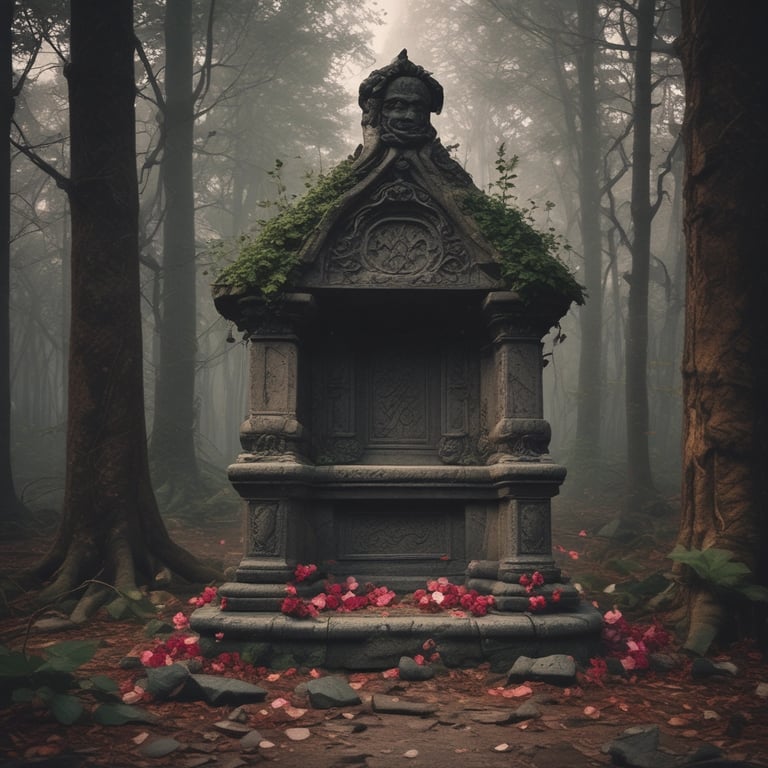Mythology Mashups: If Hades Met the Morrigan at a Funeral
WRIT ON BONE
Valkyrie
8/20/20253 min read


Imagine this: a funeral procession parting the veil between realms, incense thick as memory, and beneath the hush of mourning—two death gods meet.
He arrives cloaked in volcanic stillness, a crown forged from the weight of inevitability. She waits with a war cry coiled behind her teeth, the raven queen of fate and rot. Hades and the Morrigan, titans of the end and everything after, drawn together by grief’s velvet invitation.
This is no myth you’ve heard before. It’s a thought experiment draped in ash and prophecy—where the underworld meets the battlefield, where shadow finds its mirror. Come with me. I’ll guide you through the thrum of the funeral dirge and into a story stitched from bones and omens.
Divine Powers: Death is a Door, Not a Wall
Death, in mythology, is never just a punctuation mark. It’s a ritual. A becoming. A dark chrysalis spun in mystery and flame.
Hades, keeper of the dead and judge of souls, is no cartoon devil. He is order incarnate, solemn and incorruptible. The Morrigan, she of crimson rivers and crow-feathered prophecy, doesn’t just see death—she decides it. She haunts the threshold, whispering fate into the ears of doomed warriors.
They do not merely end lives. They orchestrate the transition. Theirs is a duet of entropy and elegance, of roles older than scripture. He maintains the balance. She tilts the scale. Together, they remind us that death is sacred and never simple.
But in meeting—do they not risk becoming undone? What happens when a constant meets a chaos it cannot calculate?
A Funeral Worthy of Gods
Picture it: twilight soaked in myrrh. Reality begins to fray at the edges, unraveling like a burial shroud. The air is clotted with incense. Whispers slither up the spine. Every mourner suspects they are not alone.
The living shuffle through the veil as though sleepwalking. Each step in the procession thuds like a heartbeat under siege. Bells toll not for the dead—but for the gods arriving in their honor.
A young widow weeps at the altar, unaware that her grief has summoned something vast and ancient. She clutches the hand of her son, who stares into the shadows and smiles. Children always see the truth first.
This is more than ritual. It is myth made flesh. The candles flicker not with wind, but with the exhale of unseen realms watching. Tradition collapses into mysticism. Mortality waltzes with the divine.
The dead speak. Or maybe it’s the wind. You learn not to ask.
Divine Confrontation: When Death Looks in the Mirror
They see each other across the altar: Hades, still as obsidian; the Morrigan, electric with warborn ferocity. They are not rivals. They are reflections. One rules what is owed. The other claims what is promised.
Hades speaks in silence, his realm orderly, inevitable. A god who abhors waste. The Morrigan arrives in a flurry of feathers and omens, her message always change. She is prophecy written in blood and brine.
This isn’t a battle. It’s a reckoning.
No words are exchanged, but the silence screams. The ground murmurs beneath their feet. This is theology as tension. Myth as magnetism.
And in that tension: recognition. Not love. Not yet. But something older. The ache of shared dominion. The knowledge that they are the same coin’s mirrored sides—one counting the dead, the other choosing them.
Mortal eyes would never survive the sight.
The Aftershocks of Immortal Seduction
When they part, they leave behind more than memory. The realms themselves tremble. You can smell it—cinders and ravens. The air hums with the echo of something... forbidden.
Not quite love. Something hungrier.
Even the dead feel it—that throb of magnetic pull, that holy ache between ruin and reign. Their encounter rewrites the soil, poisons the roses, blesses the ash.
Some say Hades left a pomegranate at the altar—not as an offering, but a promise. Some say the Morrigan left behind a feather dipped in the blood of a king. Both were gone before the last candle flickered out.
And still, the scent lingers.
It is said that when the Morrigan dreams now, she dreams of a throne of stone and silence. And when Hades thinks of war, he does so with wings brushing his cheek.
In the end, what is this tale but a myth rewritten in funeral smoke and lustful dread?
A flirtation between endings. A romance stitched from ruin.
Death, after all, always hungers for itself.
And perhaps... sometimes it flirts.
© 2025. All rights reserved.
